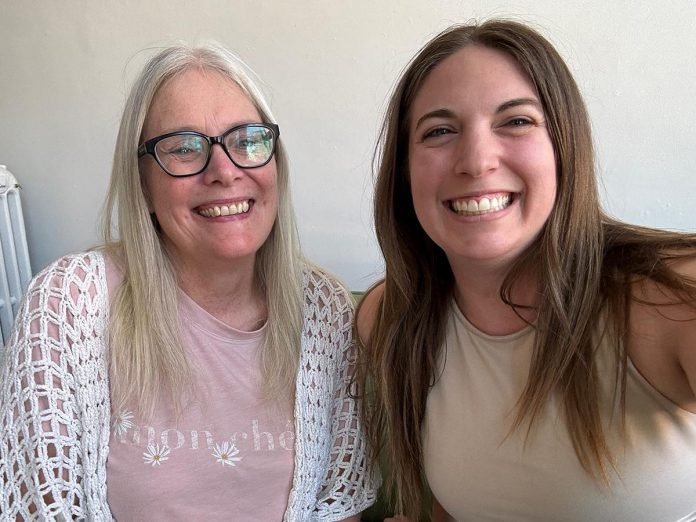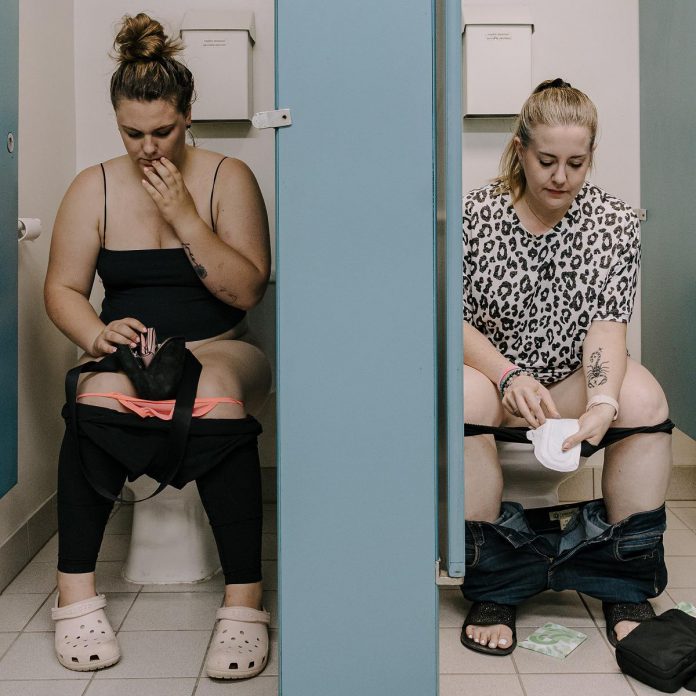
Peterborough’s next First Friday Art Crawl on October 4 will see the launch of a new photography project that aims to end the shame and stigma surrounding menstruation.
The Cycles of Change Project involves the creation and distribution of accessible photos related to diverse experiences of periods, in the hope of educating and creating conversation.
“I like to say, ‘make it less taboo, and more yahoo,'” says founder Heather Litster. “We can have funny conversations, we can play games, we can show each other how things work and share stories, and it doesn’t have to be sad. I’m excited to make it fun and normal.”
As a holistic health practitioner and menstrual educator, Litster dreamt up the project’s concept when looking through stock photos while putting resources together for clients. She was disheartened to only find photos of feathers on pads and women clutching their bodies in pain.
“There weren’t many photos that were informative or realistic about actual situations and experiences, like passing a pad to the person in the stall next to you or quietly ripping open a pad,” she says. “It just brought more to my awareness how powerful period stigma is in preventing people from accessing resources, and from truly being able to get support when they need it.”
Litster notes that the dangers of the stigma can go beyond the shame that comes from tearing open a pad in a public bathroom or asking someone for a tampon.
“People can go their entire life in chronic pain, or taking medications, or find themselves at their doctor’s office but not know how to adequately advocate for themselves because they don’t really know what’s normal and what’s not,” she says. “People just don’t have the language or the knowledge to know when what they are experiencing is not typical.”

Litster adds that the stigma is also connected to “period poverty” — the lack of access to proper menstrual products. She points to the 2023 public opinion research survey conducted by Environics Research for Women and Gender Equality Canada that states one in six people who menstruate have experienced period poverty. (The same survey found that one in four people agree periods are “dirty and unclean” and one in five agree “menstruation should not be publicly discussed and menstrual products should be kept out of sight.”)
“It’s hard for people to really being to address an issue that they won’t even talk about to begin with,” Litster says. “By making it more of a public topic of conversation, it makes it easier for people to address the poverty and for the people who are struggling to choose between diapers for their child or pads for themselves.”
For the project, Litster connected with Peterborough photographer Heather Doughty, who already has a reputation for breaking stigmas and empowering the female body with her Mom Bod project.
“I knew that she would be a photographer who the models in more vulnerable situations would feel comfortable with and she absolutely did exceed those expectations,” says Litster. “I was just so grateful for the way her creative vision really aligned with how I wanted the images to come to life, and to truly honour the nature of the menstruation experience versus hiding it.”
With help from volunteer community members, among the real-life experiences depicted in the striking photographs include a women checking another’s backside for leaks, a woman menstruating while lifting weights, and a woman struggling to reach the disposal bin in a public stall.
“It’s necessary for people (who don’t menstruate) to see stories and visuals and know their partner is not lying or their friend is not making this up,” Litster says, in reference to period cramps and pains. “As much as it might be very challenging to understand, giving more visual resources, having more conversations with the general public, and training people to have compassion is important.”
The visuals are meant to be used freely as a resource for a range of advocacy efforts — menstrual health, gender inclusivity, and the fight for access to period products among them — or for individuals and organizations to use for educational purposes.

“I had a lot of teachers in my community come to me and say how excited they were for the pictures to be released, because they don’t have a lot of relatable and helpful tools to show young people what to expect when they’re experiencing their period,” Litster says. “A visual that is realistic and relatable is something that will help make menstruation less of a scary and taboo topic going forward.”
The Cycles of Change Project will be exhibiting during October’s First Friday Art Crawl at Doughty’s studio at 129 1/5 Hunter Street West in downtown Peterborough. Litster will be popping up her Red Tent — a modern take on the menstrual tent that offers a “cozy space” to educate on and talk all things menstruation.
Litster will also have an audio recorder available for all who wish to share their own experiences.
“A big part of the work I do is encouraging community conversation because, as much as I have information for people, I think people have information to share with each other,” she says. “I just love when we’re able to create a space for that sharing.”
The Cycles of Change Project is currently seeking models for the second round of photos.
“I would love to see folks who are BIPOC or queer or even men who would be open to modelling, because some of our shots are not just about the menstruation experience but about the experience of those who don’t (menstruate),” Litster says. “Anyone of any age or any experience is welcome.”
For more information and to see a gallery of photos, visit www.cyclesofchangeproject.ca or follow the project on Instagram. Those interested in being a volunteer can contact Litster at info@heathersholistics.ca.


























